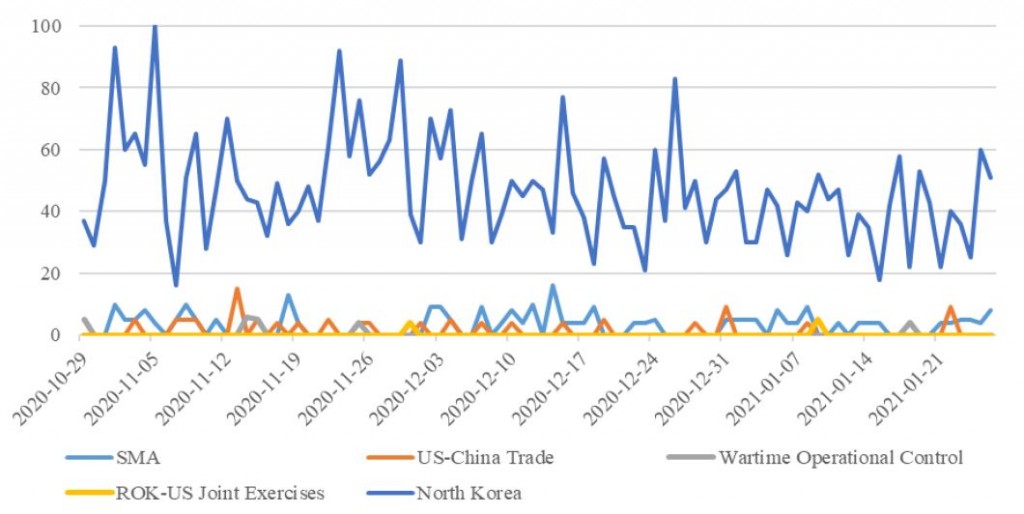Introduction1
Americans have had their say about who will lead the U.S. for the next four years; but what do others around the world think about their choice? One survey prior to the U.S. elections suggests that favorability ratings for the U.S. were at a record low among traditional allies, such as the U.K., France, Germany, Japan, Canada, and Australia.2 More recent data suggests, however, that an overwhelming majority of people in a similar set of countries are quite optimistic about their outlook on the Biden administration.3
What does South Korea as one of U.S.’s closest allies in the Indo-Pacific think about the incoming administration in Washington? This question is both timely and critical given the emphasis that President Joe Biden has placed on multilateral engagement and cooperation with likeminded countries around the world. In order for the U.S. to lead, countries like South Korea must follow. But would these countries march to the U.S. drumbeat if public support for the new administration in Washington is lacking?
This issue brief aims to explore South Korean public perception about U.S. leadership under President Biden through a survey of South Koreans conducted during December 28~29, 2020. Our findings show that there is strong support for Biden and the U.S. The outlook on bilateral relations is also quite optimistic with 63% of the surveyed public believing that the situation in South Korea will improve under a Biden watch. As a point of comparison, nearly 69% thought that Trump’s performance during his term was less than satisfactory. The results also suggest some interesting policy implications as the public shows a strong preferential leaning for the United States in the U.S.-China competition as well as support for trilateral cooperation among South Korea, the U.S., and Japan.
Biden over Trump
One thing going for the incoming U.S. administration is strong support from both within and outside of the United States. In a survey conducted by the Pew Research Center during January 8~12 of this year, 64% of American voters expressed a positive opinion about Joe Biden’s conduct since he won the election in November.4 In contrast, the percentage of voters who rated Trump’s conduct since the election as fair or poor rose from 68% in November to 76% in January. In another survey conducted by the same outlet from November 12 to December 23 of last year, large majorities in Germany, France, and the U.K. expressed optimism about their country’s relationship with the U.S. under the Biden administration.5 Similarly, a large percentage of the European public also expressed confidence in Biden’s ability “to do the right thing in world affairs.” In a separate survey conducted by Ipsos, 48% of those surveyed from 24 countries around the world preferred Biden over Trump in the last election; only 17% preferred Trump over Biden.6
Our most recent survey of the South Korean public confirms these trends. While we saw a significant and steady decline in support for U.S. leadership after July 2019, our most recent survey indicates a turnaround after the November election. According to our average favorability measure, which is evaluated on a scale of 0 to 10 (0= not favorable at all, 10= very favorable), Donald Trump was rated as 3.44, whereas Joe Biden was at 5.89. It is worth noting that Trump’s favorability for the better part of his term was below neutral (5) except when it peaked after his meeting with Kim Jong Un in Singapore during June 2018 (5.16).
Figure 1. Favorability towards U.S., China and Their Leaders7 (0~10 point)
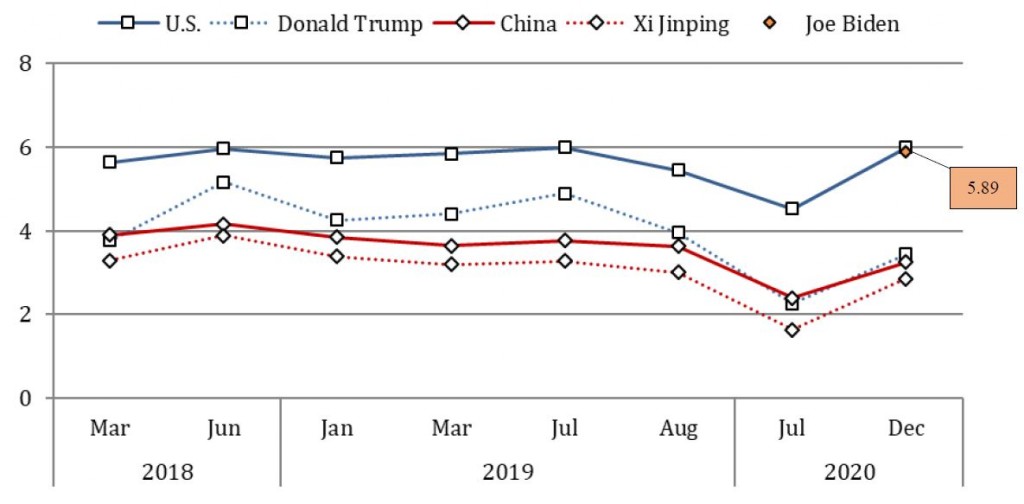
There were some notable differences by age as older respondents favored President Biden (50s: 6.31, 60+: 6.99) more so than younger ones; the same was not the case for Donald Trump. Ideological differences also seemed to matter for President Biden as the difference in favorability among progressives (5.60) and conservatives (6.20) were shown to be statistically significant.8
Table 1. Comparison of Favorability towards Trump and Biden9 (0~10 point)
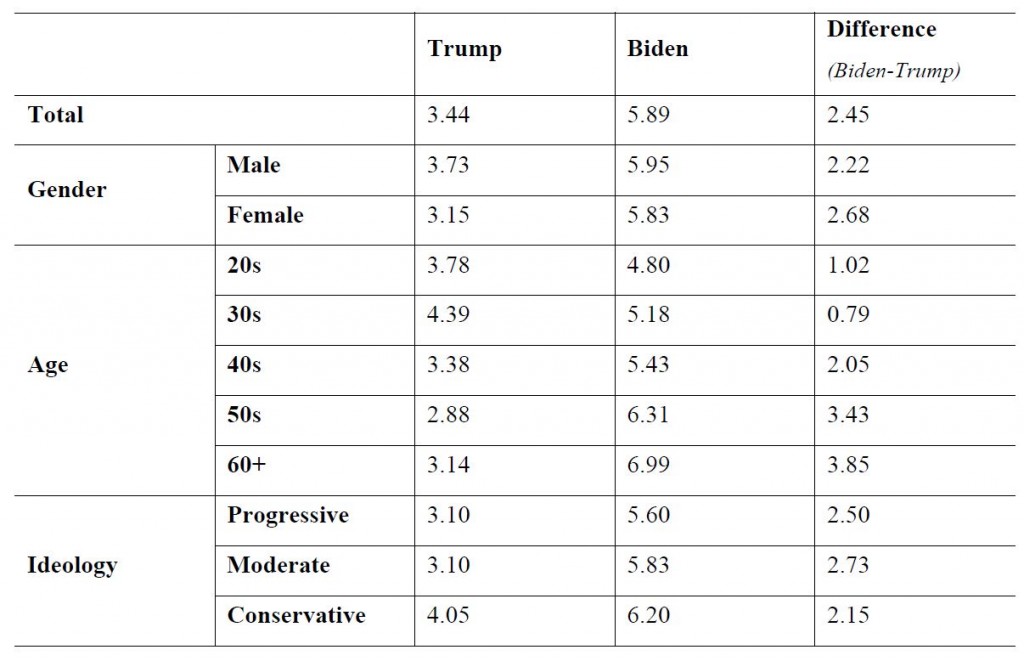
Given that 68.7% of the respondents rated Trump’s performance over the last four years as being less than satisfactory, the results we see above are not at all surprising. When asked for reasons as to why the respondent rated Trump’s performance as being less than satisfactory, 33.9% stated that they did not support his policy of marginalizing multilateralism and international order. 23.2% blamed Trump for the rise in social tensions and troubled race relations within the United States and 15.6% stated that Trump did not respond well to the COVID-19 pandemic. It is interesting that less than 20% of the respondents rated Trump’s performance poorly because of his handling of issues that are more directly relevant to South Korea’s interests. For instance, only 9.9% blamed Trump for his failure to make progress on U.S.-North Korea relations, and just 9.5% attributed rising tensions between the U.S. and China as the main reason for their negative assessment of Trump.
When respondents were asked about their views on the overall situation in and around the Korean Peninsula under Trump’s watch, 54.5% were negative and only 34.2% were positive. Progressives (44%) assessed Trump’s impact on the Korean Peninsula as being more positive than conservatives (31.1%) or moderates (27.6%), while conservatives (59%) and moderates (61.1%) were more negative than progressives (45.6%). The ideological divide may be linked to the fact that the South Korean progressives have favored Trump’s policies on North Korea and the alliance even though President Trump has been condescending in his public statements about South Korea. Even President Moon spoke very highly of Donald Trump over the past four years, suggesting at one point that President Trump deserved the Nobel Peace Prize for his work on ending the standoff between the U.S. and North Korea.
The clear preference for an incoming U.S. president in comparison to an outgoing one stands in marked contrast to 2016. Where data is available, President Obama’s average favorability among the South Korean public never dipped below neutral (favorability rating = 5.0) during his term. In fact, Obama’s favorability was at an all-time high as Trump was about to take office, while the latter’s favorability was half that of Obama at the time of Trump’s inauguration.10 This suggests that the South Koreans are potentially building up higher expectations about the next four years under Biden than under Trump.
It is important to point out, however, that this optimism does not pertain only to South Korea’s relations with the United States. We can see a similar rebound in President Xi Jinping’s overall favorability. Xi’s favorability in December is 2.86, which is significantly higher than the low recorded during July 2020 (1.63). One explanation for this change can be attributed to anticipated changes in U.S.-China relations under a new administration in Washington, as odd as that may seem to those who anticipate renewed tensions.
The rising favorability of these leaders is also coupled with an increase in the favorability of respective countries. For instance, the U.S. favorability is 5.99 which is comparable to the level last seen in July 2019. China’s favorability also rebounded but by a smaller margin (Jul 2020: 2.4 → Dec 2020: 3.25) than that of the U.S.. This suggests that the results of the U.S. election have impacted the South Korean public’s perspective on the individual personalities directly linked to the election outcome and the perspective on the U.S. as a nation, other stakeholders, such as China and its leadership.
Brighter Days Ahead
To delve deeper into the South Korean public’s outlook on the U.S. and ROK-U.S. relations, we asked a series of questions about how they saw the overall state of affairs in and around the Korean Peninsula under a Biden White House. For instance, when the survey respondents were asked whether they had a positive or negative outlook on the Korean Peninsula under a Biden presidency, 63% expressed that they were positive; only 25.9% were pessimistic. 72.5% of South Koreans also thought that U.S. influence will grow under a Biden leadership. Only 19.5% thought that this would not be the case. Interestingly, there was no noticeable variation across different demographic characteristics on these questions.
Similarly, the outlook on the ROK-U.S. bilateral relationship was overwhelmingly positive with 74.7% of the respondents expressing optimism and only 18.3% expressing pessimism. As a point of comparison, this figure is similar to 75.1% of the South Korean public that anticipated improved ROK-U.S. relations when President Obama was reelected in 2012. In contrast, 64% of the surveyed respondents felt that the ROK-U.S. bilateral relations would worsen after President Trump was elected in 2016.
Figure 2. Prospects for ROK-U.S. Relations11 (%)
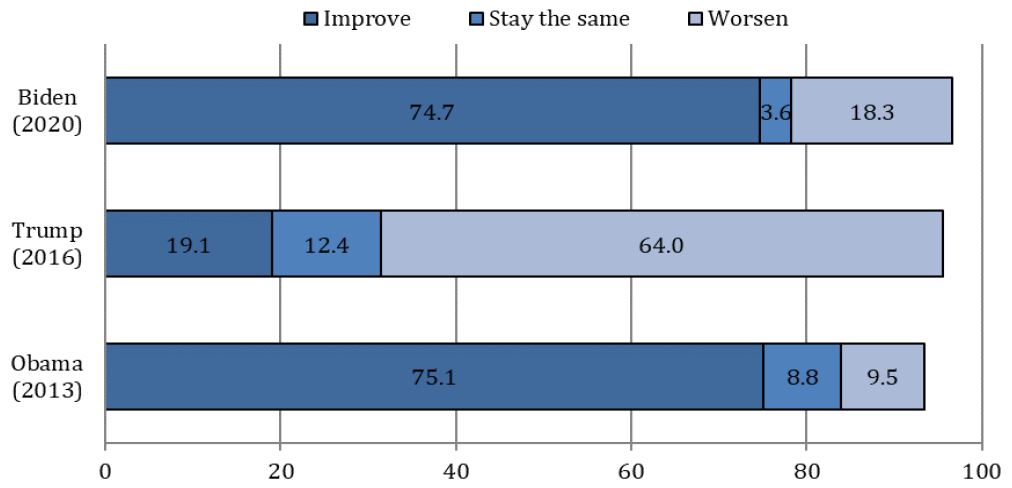
When asked about the reasons, 42.6% thought that the bilateral relationship will improve due to improved cooperation among allied nations under a Biden watch. 18.4% cited a positive outlook on the Special Measure Agreement negotiations as their main reason. 18.1% stated that the value of ROK-U.S. alliance would grow due to growing U.S.-China competition. Finally, only 10% of those who expressed optimism about ROK-U.S. relations stated that their reason for doing so was due to the likelihood that the Biden administration would engage in a nuclear dialogue with North Korea.
Among those who expressed pessimism about the ROK-U.S. bilateral relations under a Biden presidency, 48.3% stated that they did so because they expected a change in the Biden administration’s approach to the North Korean nuclear issue. 23.7% stated that they thought that more heated U.S.-China competition would negatively impact ROK-U.S. relations. Approximately 12.2% stated that they are pessimistic about the bilateral relationship because Biden’s approach to the alliance will be a continuation of Trump’s policies.
When asked to name the most important issue on the agenda for the ROK-U.S. alliance, 25.3% cited North Korea (and related issues), 16.7% rated the SMA negotiations as the next most important issue followed by the U.S.-China trade war (13.5%), wartime operational control (OPCON) transfer (11.6%), military-to-military cooperation (i.e. joint exercises) (11.4%), cooperation on infectious diseases (10.6%), and climate change (3.6%). What this suggests is that the South Korean public is more concerned about outstanding traditional alliance-related issues rather than global challenges like climate change.
Figure 3. Important Issues for the ROK-U.S. Alliance12 (%)
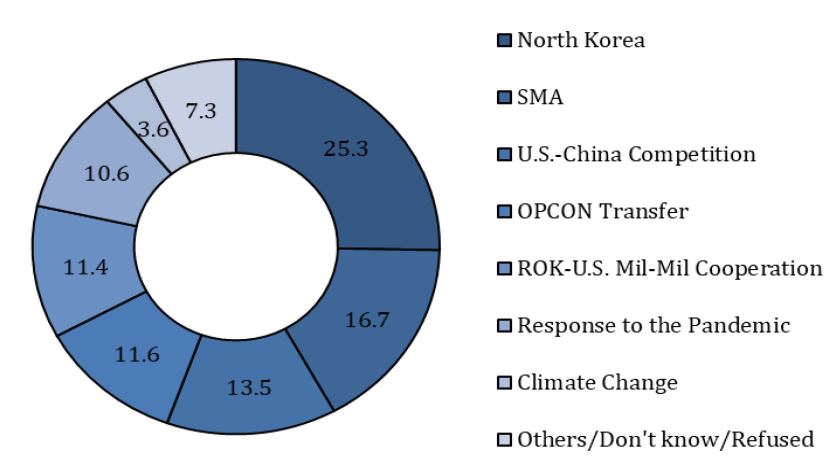
This is not all that surprising if we consider the fact that the Korean media chatter on the ROK-U.S. alliance has focused mostly on bilateral issues. For instance, if we examine web keyword searches for “North Korea,” “SMA,” “U.S.-China trade,” “wartime operational control,” and “joint exercises,” the ordinal ordering of indexed search occurrence matches the ordering of relative frequencies we found in our survey data.
Figure 4. Web Keyword Search13
Oct 29, 2020 ~ Jan 26, 2021
Feb 2, 2020 ~ Jan 26, 2021
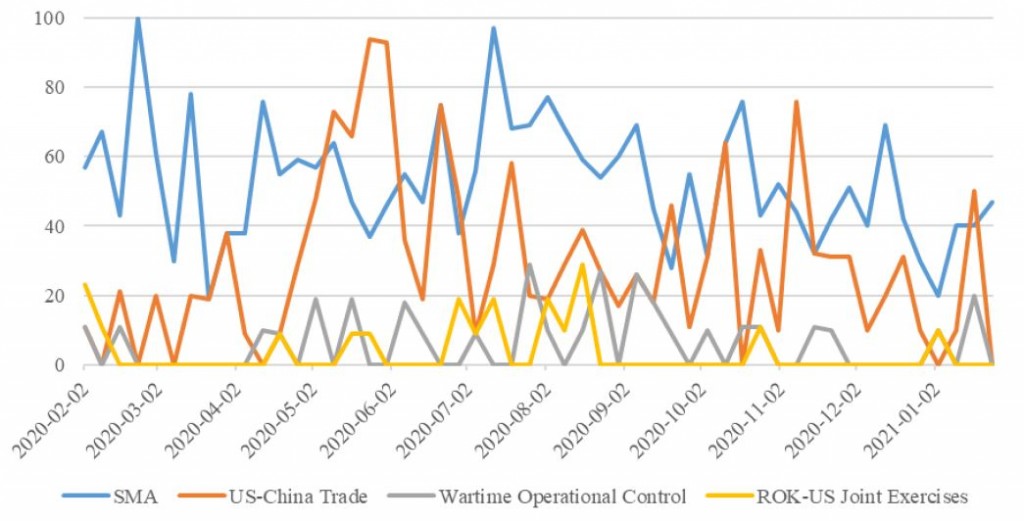
It is interesting to find, however, that the South Korean public maintains a more transcendent forward-looking vision of the bilateral relationship than in the past. When asked to choose what they thought about the future of ROK-U.S. alliance, 66.3% of the respondents stated that the alliance should be built on principles such as “democratic ideals, human rights, and universal values.” Only 28.8% of the respondents answered that the bilateral relationship should be limited to focus only on the North Korean security threat. When a similar question was asked in 2016, approximately 51.2% stated that the alliance should be based on universal values; 42.4% stated that the alliance should be limited to address the security challenges. What we see is a sizable increase (+15.1%p) of the public recognizing the importance of values in the bilateral relationship.
Figure 5. Future of the ROK-U.S. Alliance Should Be Based On…14 (%)
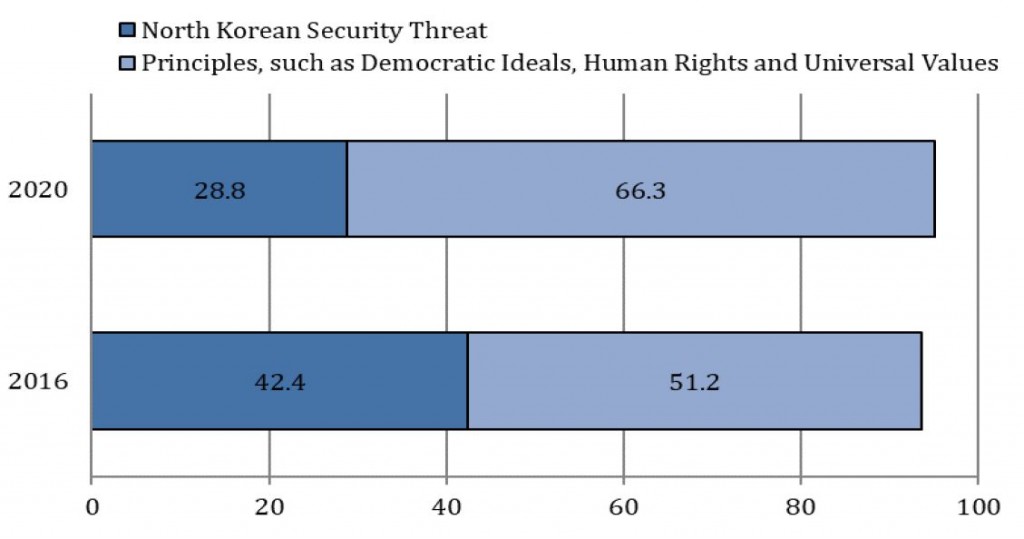
On the issue of Korea-China relations, 44% stated that they thought the relationship between Seoul and Beijing would improve while 41.3% stated that they thought the relationship would worsen. When asked about their preferences between China and the United States, however, 73.2% preferred to strengthen cooperation with the United States. Only 10.4% thought that South Korea should strengthen ties with China. 16.4% were undecided.
The survey respondents also believed very strongly that cooperation between South Korea, the U.S. and Japan needed to be strengthened (69.4%) in order to deal with the security challenges arising from the growing threats posed by North Korea and China. 69.6% also supported holding a trilateral ROK-U.S.-Japan summit (Oppose 18%). The support was especially strong amongst conservatives (76.7%) and moderates (71.4%) in comparison to the progressives (64.9%), who were twice as likely to oppose the idea of trilateral cooperation between South Korea, the U.S., and Japan.
Room for Improvements in Public Understanding
Our survey finding suggests that there may be some room to broaden the South Korean public understanding about issues of vital interest to the Biden administration. Within a day of occupying the Oval Office, for instance, President Biden had taken executive actions to recommit the U.S. to the Paris Climate Agreement and World Health Organization. Through his writing, Joe Biden has also expressed an interest in hosting the Summit of Democracies and earlier spoke of possibly renegotiating CPTPP.
Before asking whether the Korean public had any opinion about these matters, we wanted to see if the surveyed respondents had any prior knowledge about the “Summit of Democracies,” 49.8% state that they have heard of it but they do not know what it is. 19.7% stated that they have no knowledge of this issue. That is, nearly 70% of the South Korean public do not have adequate knowledge to form an informed opinion about this matter.
Table 2. Public Understanding on Summit of Democracies and CPTPP15(%)

Similarly, 46.8% states that they have heard something about the Comprehensive and Progressive Agreement for Trans-Pacific Partnership (CPTPP) but that they do not know what it is. 26.6% stated that they do not have any knowledge about this issue. Together, this accounts for over 73% of South Koreans surveyed that do not have adequate knowledge or understanding about the region multilateral trade agreement.
It is likely that these issues will draw more interest as the U.S. presses forward with President Biden’s commitments. But if the Biden administration seeks to have more buy-in from countries like South Korea, it would bode well for Washington to expand its public diplomacy and outreach on these kinds of issues. This is especially true as the Moon administration enters the last year of its term with the next presidential election scheduled for early 2022.
Conclusion
While the United States faces a two-front challenge of managing domestic problems (i.e. COVID-19, recession, and polarization) and restoring confidence in U.S. leadership on the global stage, the Biden era begins with some tail winds in the form of strong public support both at home and abroad. Our most recent survey confirms that there is genuine excitement and interest about the Biden presidency in South Korea. But high expectations require better than expected performance. Just as quickly as the South Korean public opinion has shifted in favor of the United States, the situation can also change for the worse. In the end, what matters is how the Biden administration utilizes the current positive momentum in its brand and image as it begins to engage with other countries around the world.
The Moon administration, on the other hand, must come to terms with the reality of South Korean public perception about the United States and the new leadership in Washington. This is especially true as the current government enters the lame duck period in which ROK-U.S. bilateral relations can weigh on the minds of South Korean voters in the coming presidential election. While North Korea is an important priority for the Moon administration, there are a number of unresolved issues with respect to the ROK-U.S. alliance (i.e. SMA and OPCON) which need to be addressed in 2021.
The South Korean public also appears to have a clear position on matters related to U.S.-China competition and ROK-U.S.-Japan trilateral cooperation, which are all informed by the reality of the regional alliance network. Provided that U.S.-China relations become more contentious, Seoul will need to prepare a clear position on these issues. This is due to the fact that the dispute over South China Sea, clean network initiative (i.e. Huawei), and regional security cooperation are all linked to the alliance and South Korean national interest as our survey suggests. Public opinion need not always be the sole guide for policy; but leaders should be duly informed of the political consequences of their decisions and the subsequent impact on their legacy. The people of South Korea have spoken.
Survey Methodology
Asan Survey
Sample Size: 1,000 respondents over the age of 19
Margin of Error: ±3.1% at the 95% confidence level
Survey Method: Random Digit Dialing (RDD) for mobile and landline phones
Period: December 28~29, 2020; see footnotes for additional dates.
Organization: Research & Research
The views expressed herein do not necessarily reflect the views of the Asan Institute for Policy Studies.
- 1. The authors would like to thank Choi Kang, Park Jiyoung, Gil Rozman, and Eun A Jo for their comments and feedback on earlier versions of this paper. Standard caveats apply.
- 2. “U.S. Image Plummets Internationally as Most Say Country has handled Coronavirus badly,” Pew Research Center. September 15, 2020.
- 3. “British, French and German Publics Give Biden High Marks after U.S. Election,” Pew Research Center. January 19, 2021.
- 4. “Biden Begins Presidency with Positive Ratings; Trump Departs With Lowest-Ever Job Mark,” Pew Research Center. January 15, 2001.
- 5. “British, French and German Publics Give Biden High Marks after U.S. Election,” Pew Research Center. January 19, 2021.
- 6. “Outside the U.S., Biden is the clear favorite,” Ipsos. October 23, 2020.
- 7. Source: Asan Survey (Dates: Mar 21~22, Jun 18~20, 2018; Jan 7~9, Mar 19~20, Jul 9~10, Aug 19~21, 2019; Jul 15~16, Dec 28~29, 2020).
- 8. There was a statistically significant difference for Trump’s favorability (t=3.538, df=980.879, p<.001) among males (3.73) and females (3.15).
- 9. Source: Asan Survey (Dates: Dec 28~29, 2020). Independent t-test and ANOVA(F-test) with post-hoc (Scheffe) tests were performed for pairwise comparisons. Test statistics are as follows: Trump favorability (age F=9.501, df=4, p<.001; ideology F=15.191, df=2, p<.001), Biden favorability (gender t=.748, df=970, n.s.; age F=169.772, df=32.511, p<.001; ideology F=5.134, df=2, p<.05).
- 10. Jiyoon Kim, Lee Jihyung, and Kang Chungku. “Trump Time: Koreans’ View of ROK-US Relations.” Issue Brief. The Asan Institute for Policy Studies. January 13, 2017.
- 11. Source: Asan Survey (Dates: Oct 10~12, 2013; Nov 22~24, 2016; Dec 28~29, 2020).
- 12. Source: Asan Survey (Dates: Nov 22~24, 2016; Dec 28~29, 2020).
- 13. Source: Google Trend. The Y-axis is indexed to 100 where 100 is the maximum search interest for the period mentioned in South Korea (only). The searches were for Korean translation of the keywords listed, except for “SMA.”
- 14. Source: Asan Survey (Dates: Nov 22~24, 2016; Dec 28~29, 2020).
- 15. Source: Asan Survey (Dates: Dec 28~29, 2020).

 Facebook
Facebook Twitter
Twitter